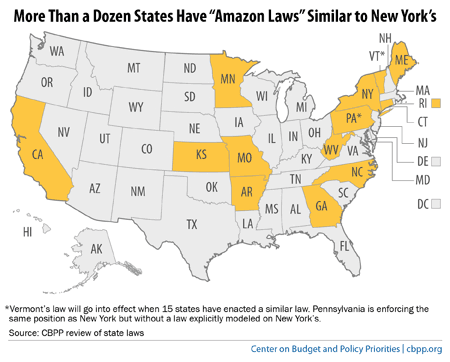más allá de los números
Supreme Court Opens Door Wider for Collecting Internet Sales Taxes
By declining to hear a challenge to New York State’s “Amazon law,” the U.S. Supreme Court has now helped pave the way for states and localities to collect more of the roughly $13 billion that they’re owed each year in uncollected sales taxes on Internet purchases. That should encourage other states to pass similar laws, though only federal policymakers can solve the problem comprehensively.
First, some background. Previous Court decisions held that a merchant must have a “physical presence” — generally, employees or facilities — in a state before that state could require the company to charge sales taxes to its customers there. Although buyers are legally obligated to pay directly to their states any applicable taxes that the merchants don’t charge, very few do.
But the Court has also said that people who aren’t employed by the merchant but help market its goods constitute a “physical presence.” So, New York enacted a law requiring Internet merchants with in-state “affiliates” to charge sales taxes on all taxable sales to New York customers. “Affiliates” are companies and individuals that link to an Internet retailer from their own site and receive a commission when someone clicks on the link and buys something on the merchant’s site.

Amazon and Overstock, two of the many large retailers that operate affiliate programs, challenged New York’s law. But New York’s high court upheld the law, and yesterday the U.S. Supreme Court let that decision stand.
More than a dozen states (including New York) have enacted laws requiring Internet retailers with in-state affiliates to charge tax on all taxable sales in the state (see map). Now that New York’s law has withstood all legal challenges, other states may follow its lead. Amazon laws can chip away at the problem even if they don’t represent a full solution, I’ve explained.
A federal law that empowered states to require all sellers to collect sales tax would:
- Help states and localities maintain public services and possibly reinvest in services they cut during the recession — rehiring teachers, freezing college tuition increases, and boosting road and bridge maintenance, for example.
- Create a more level playing field for local store-based retailers, which do collect sales taxes.
- End the unfair sales tax treatment of consumers who don’t shop online, including low-income people who lack computers, Internet access, or credit cards.
The federal Marketplace Fairness Act, which represents a fair and comprehensive solution to the problem of uncollected tax on Internet and other interstate sales, passed the Senate in April but is stalled in the House. Until it moves, states need to do what they can to address the problem themselves. The Supreme Court has now cleared a big obstacle in their paths.
